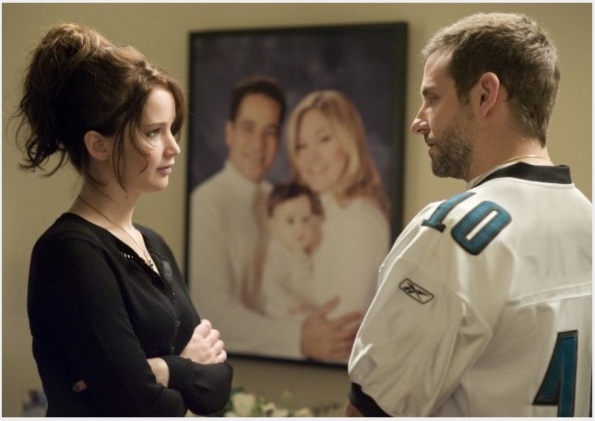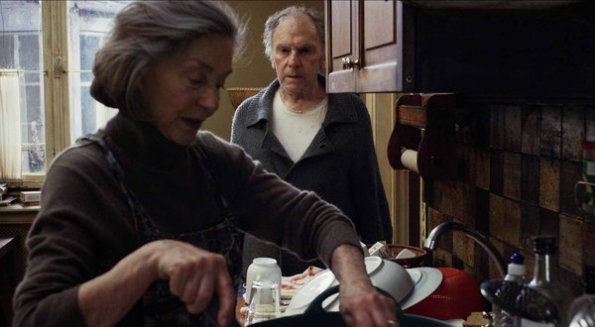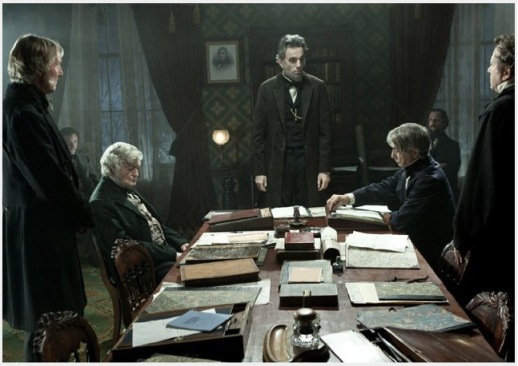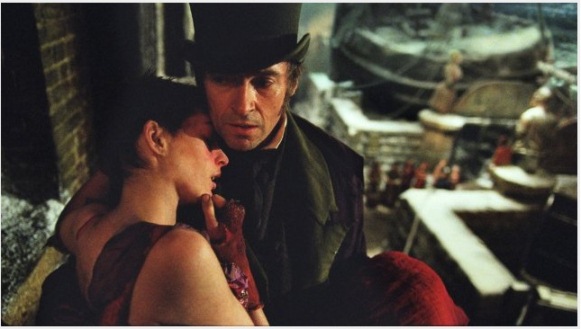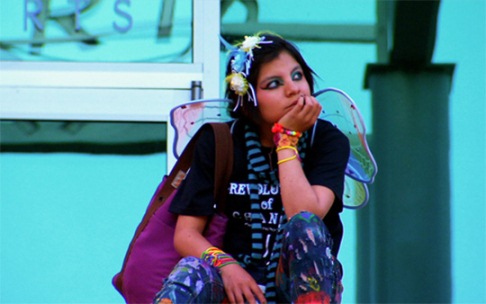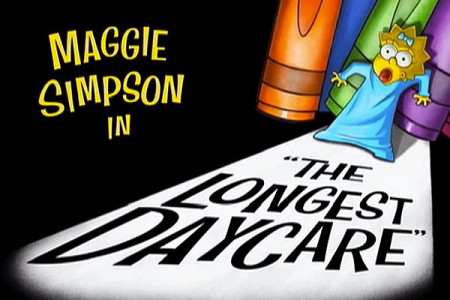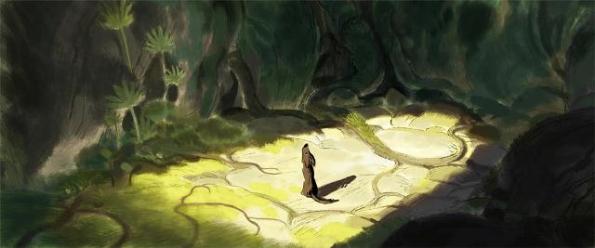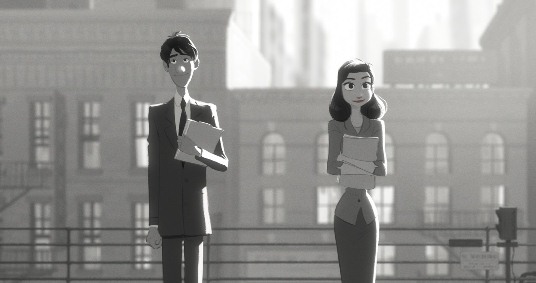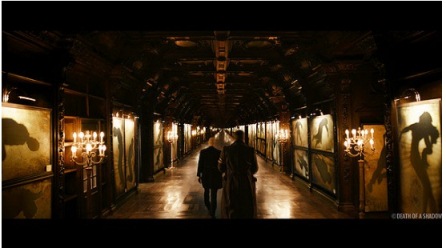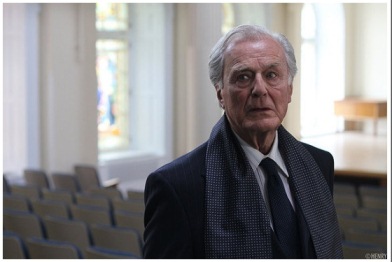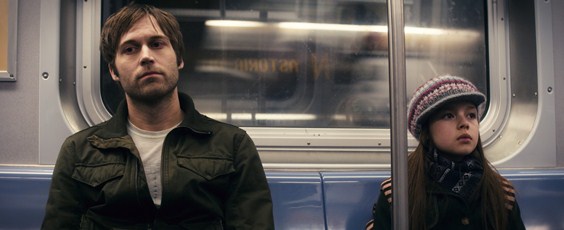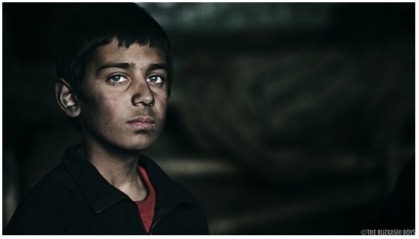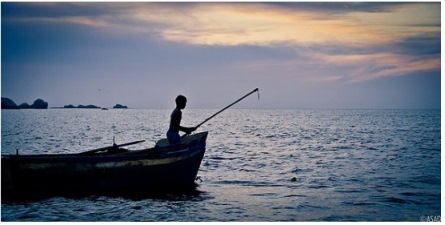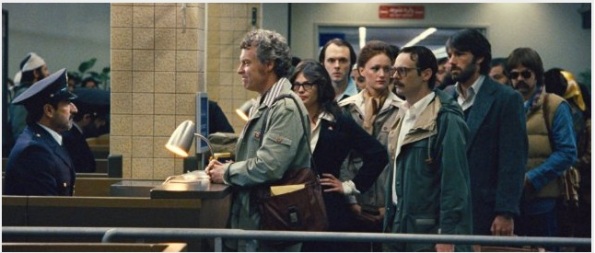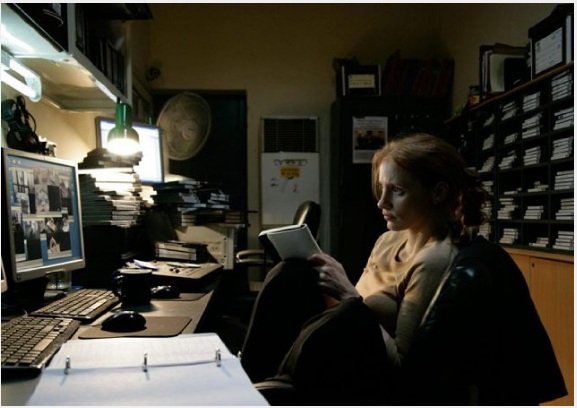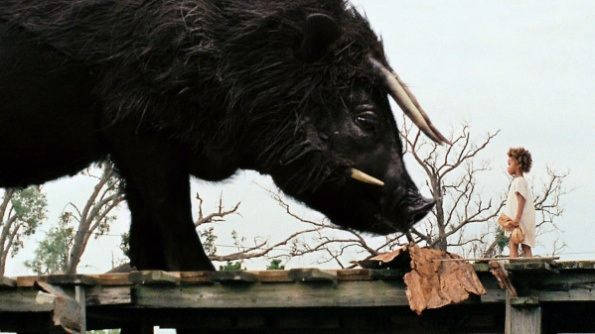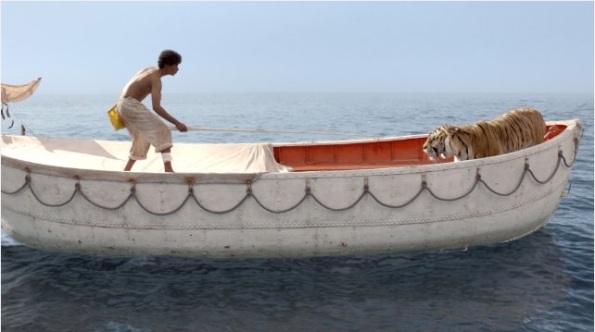Archive
Oscar Movies: Dysfunctional Love Stories
A strange case, Silver Linings Playbook. It’s basically a romantic comedy, a trifle that got this huge awards push for some reason (Harvey Weinstein) and thus masqueraded as something grander and more important than it is.
Now listen, I have nothing against proclaiming a romantic comedy as a piece of greatness. Romantic comedies are a crucial part of film history. It Happened One Night won a jillion Oscars back in 1935 and it deserved all of them. Annie Hall deserved its award attention in 1978. I am one of those secret Shakespeare in Love (Best Picture, 1998) supporters, even, because I think one, that movie is brilliant, and two, Saving Private Ryan is overrated.
That’s all right. Go scream and bang some dishes. You’ll get over it, and then come back.
I don’t know that Silver Linings Playbook is of the level of those other movies. It Happened One Night is special just because it’s a near-perfect filmic experience in an era when everything about film was newborn. It set precedents for romantic bickering, comedic action, pacing, movie star charisma, everything. Annie Hall is one of those defining-a-generation movies. (Mmmm, zeitgeisty.) Shakespeare in Love succeeds at comedy and drama, and has a perfect screenplay. (Perfect.) Playbook, on the other hand, does not have a perfect screenplay—it strains and is contrived in places. It is not heartbreakingly of its time. It doesn’t feel new about anything.
Here is what Playbook is: a really funny, genuinely romantic, undoubtedly well-acted, charming movie that we’ll all have forgotten in a couple years, but which you will not regret having shelled out a tenner to see. See, my secret is that I love romantic comedies. Despite being perpetually disappointed by them. The modern romantic comedy is terrible. It’s stupid. It’s sexist. It has Gerard Butler in it. Playbook is a movie that boldly proclaims, “A romantic comedy doesn’t have to be terrible!”
Somehow, everybody tried a little harder on this one. The hook is mental illness: Bradley Cooper, our main character, is a man who in his late twenties or early thirties (not sure if he’s playing his own age, or younger; there is some evidence that he is) is newly diagnosed as bipolar. He has a violent incident in his past for which he spent several months in a mental institution. In the opening scene of the movie, his mother has come to check him out, despite everyone’s anxiety that he’s not ready for the stresses of reality.
Cooper’s character, Pat, has convinced himself that he can overcome his own brain functions with exercise and positivity. He feels strong; he feels like he can take that bipolarity and just choke it dead. And I LOVE that the movie acknowledges almost immediately what a bad and erroneous idea this is. Pat goes back on his meds pretty quickly, because brain chemistry and state of mind are different things, something movies almost never tell you. His psychiatrist is also really good. Movie shrinks tend to be terrible; they say ridiculous things, they encourage their patients to do out-of-character, off-the-wall things because they live to establish plot contrivances. Pat’s guy listens, reacts, reframes.
(Beyond that, some of the things the movie has to say about mental illness are weird, at best. Other reviews can fill you in on that, because it didn’t bother me so much.)
Jennifer Lawrence sails in amidst Playbook’s biggest contrivance: healing through dance. Lawrence’s Tiffany, who is clinically depressed, in a self-destructive heavy-eyeliner kind of way, is a ballroom dancer, and she needs a partner for a big competition. Pat balks at being that partner, but Tiffany’s also a great manipulator and plays an emotional trump card. She knows just what’s important to him, and how to dangle it in front of his face. So he’s caught up, and we get a classic mismatched pair of misanthropes who will “improbably” fall in love.
Again, so obvious, so done before. Still, dancing is always interesting to watch, and everybody in this film is basically excellent. Cooper manages to vault right over his usual douchey Cooperness. The buzz cut helps; he doesn’t so closely resemble Hangover guy. There was something else he did, though, that I really enjoyed. I don’t know how to explain it really, except to say that he was a serious guy who was also funny to watch. The character is hyper; he takes things to ridiculous extremes. To a degree, even his trials and tribulations are funny. The movie knows that, Cooper knows that. But Pat takes himself 100% seriously. And Cooper plays that contradiction: a dead serious guy, smack in the middle of a romantic comedy.
You know who else is great? Robert De Niro. There was a time when that didn’t need to be specified, but we all know De Niro’s kind of lowered his standards in the last decade or so. This character he plays, Pat’s dad, is not built from De Niro clichés, he’s not a tough guy. He’s actually quite a sensitive dude. He has OCD, and he is devoted to the concept of good luck charms. He thinks Pat is one of them, and uses that as a way to guilt Pat into spending more time with him (i.e., “The team lost, and you should’ve been here!”). Pat’s negotiations with his family—trying to rebuild those relationships and regain their trust—are as important to the story as the romance, and that gives the story a little extra weight.
Awards Attention: Though it was up for Best Picture, Director, Adapted Screenplay, and, weirdly, Editing, it was never really in the running for any of those. Playbook is an actor’s movie, so that is where bets were laid. Though the movie came away with one just Oscar, for Jennifer Lawrence in her lead role, there were four nominations—Cooper, De Niro, and Jacki Weaver as Pat’s mom had the other three.
Weaver had the least real chance; not only was she up against a powerhouse (Anne Hathaway from Les Mis), but she had a nothing role in this movie. She was nominated a couple years ago for a movie called Animal Kingdom in which she seemed equally underused until this scene at the end where she suddenly delivered this chilling speech that made you realize there was tons more to her character than you had initially thought. I kept waiting for something like that in Playbook, and it did not happen. De Niro, on the other hand, is doing something very special here—a very modulated, fidgety, improbably emotional tough guy. I thought he had a good chance, but it did not work out for him.
Bradley Cooper is, as I wrote above, just great in this movie, but he was up against Daniel Day Lewis as Lincoln, and never had a shot in hell. The best thing he’s going to get out of this is being referred to as “Oscar nominee Bradley Cooper” in movie trailers from here on out, which is not a bad thing for him.
As for Jennifer Lawrence, I watched The Hunger Games again this week, and—she made these two movies in the same year—I feel like her performance in Hunger Games was so much more intense than Playbook. The circumstances of that movie are just naturally more intense—being hunted for your life will do that—but it still seems like a problem. I don’t want to play into any stereotypes about acting—“there has to be tons of emoting in tons of intense situations or it’s not really acting!”—but the role here just seems slight, compared to others she’s done (Winter’s Bone has another great performance of hers, in another much more serious film).
Having said that, there were a couple moments in Playbook that I found impressive. Not the “I must be crazy!” diner freakout they used as her clip at the Oscars, which seemed overdone, nor the “schooling everybody in football stats” scene everyone assumed they would use as her clip at the Oscars, which was more about the writing than anything special in the delivery. But I loved her nearly-hyperventilating anxiety when she blows up at her sister for inviting Nicki to the dance competition, and the broken, longing looks she sometimes gives Pat when he’s ignoring her. And she danced real cute, and we all love her regardless, so congrats on the Oscar, Jennifer.
This movie was in strong contention over at Tomato Nation’s recent bracket tournament for the bleakest and most depressing movies ever. It is a movie that many moviegoers—even those game for foreign films and/or Oscar bait—skipped because of its subject matter. It’s about an elderly couple, Georges and Anne (played by Jean-Louis Trintignant and Emmanuelle Riva), and their love which increasingly becomes painful obligation as health problems begin to plague Anne.
I read a lot of comments by people who specifically said they wouldn’t see any movies where grown-ups have to wear diapers. Well, guess what. There are adult diapers in this movie. It is Hard to Watch, much like the movie Tracy Jordan was in on 30 Rock. Anne loses her dignity in myriad ways that Haneke lays out to be as bracing as he can. It takes something that people so willingly ignore—the fact that our bodies age, deteriorate, and then die—and makes it everything, unignorable. Unless, I guess, you don’t show up in the first place.
The movie opens when both are in good health; they come home from a concert (they were classical musicians, formerly), they banter about bedtime. They are both trim and not badly-dressed and seem like models for fulfilling elderlihood (a word I just made up). Then Anne has the world’s creepiest stroke (Haneke has also directed some thrillers, and here and there it shows—quite effectively) and it all goes to hell.
Actually, they roll with the punches first. She is partially paralyzed to begin, largely immobile all down her left side, but still is able to get around a little bit, generally using her husband as a crutch. He will grab her on her right, arms around her, and almost drag her around in half-circles, and that way she can move. It looks almost like slow-dancing, which is not a coincidence. We see her sitting in bed reading, holding and turning the pages both with her good hand. A former piano student of hers visits, and while he is uncomfortable with her appearance, she waves it away. (Even though the loss of a full hand’s functionality for a pianist is a real tragedy, one that the movie does not forget to illustrate.)
There is even one particularly funny little moment when some medical dudes bring Anne a motorized wheelchair and she tries it out in the vestibule of their apartment. She moves it a few feet forward, a few feet back, whirls it in a slow circle, all while Georges talks to her about something else. It’s the closest thing to freewheeling behavior you really see in the whole movie. They still believe at this point that they will weather this setback; that it will mean a different life for them, but not a worse one.
And it just gets worse and worse from there. A movie about eighty-year-olds with health problems is really only going to end in one way. What this movie wants to make clear, though, is that sometimes it happens slowly, and that makes it harder for everybody involved, especially for people who have previously loved each other as independent, self-possessed adults. Georges takes considerate care of Anne at every second, until he is forced to hire a nurse who can do some things he can’t. All through the movie I kept marveling, “He’s old too!” He must be tired, he must have aches and pains, but he makes everything in their life about taking care of her. He bristles at intimations from his daughter (played by Isabelle Huppert) that Anne needs to be put away somewhere.
Trintignant is amazing, by the way. Riva got all the attention because her performance involves so much physicality (paralysis, plus looking less and less like a human as she goes on) but the resolve of Georges—that Anne deserves this commitment from him, even though it’s sapping the life out of him, too, even though her decline fills him with profound sadness—it’s astounding and done almost totally in the way he looks at Anne, or stares into space.
There is a strange moment, a line where Anne tells Georges that he “can be a monster sometimes.” It was in the trailer, which I saw a dozen times before the movie came out. She says it quite matter-of-factly, he doesn’t ask for clarification, they don’t discuss it more. Is she serious? Has he been cruel in the past? We just don’t see any evidence of that in the scenes we do see. There is one moment when he succumbs to frustration and slaps her, but it seems to be the result of intense fear and stress, and not a fundamental meanness inside him. Because of its placement in the trailer, I assumed this movie would be about an older man who has neglected his wife, and who has to step up (or fails to step up) when she becomes ill. But (other than that line) that’s not what we see here. It’s very strange. Maybe it’s just a line to remind the audience not to make assumptions. “We may be here now, but there were fifty or sixty years prior to this, and you don’t know what was going on then.”
Despite the devastating nature of the subject matter, there is beauty to Amour, too, in their beautiful metropolitan apartment if nothing else, but also in little moments when Anne and Georges are just coping as best they can. They do have “amour” for one another, and even though it’s a double-edged sword (that title just drips with irony), there is something admirable in sharing a life with someone literally until death.
Awards Attention: It won Best Foreign Language film, to nobody’s surprise. I think its placement in the Best Picture race (where it lost, of course) was mostly to prove to people that the Academy is cool and not in the pocket of Big Hollywood. It was never going to win that, of course. And I wouldn’t have voted for it for that, either, mostly because it’s such a small story; still, in thinking about what makes a movie a success, we can’t forget that telling a story that’s affecting and honest and deep doesn’t happen without some serious artistry behind the camera.
Haneke lost Best Director to Ang Li, who put tigers in lifeboats, and lost Best Screenplay to Quentin Tarantino. This is probably because no one ever stops speaking dialogue in Tarantino movies, while Amour was about 70% intense silence. I will say that Amour’s non-linear narrative (which begins at the end) was a very effective storytelling choice.
Finally: Riva was nominated for Best Actress. She lost the Oscar to Lawrence, but beat both her and Jessica Chastain for the BAFTA a few weeks earlier. As I said above, the physicality is the real marker of skill in this performance. She moves freely and easily, and then she droops on one side. And then her body becomes more and more maimed, and then her eyes become more and more vacant. She physically becomes a shell of a person. And while you can’t underestimate the effect of makeup here, Riva is really doing something that you need to be an actress with 60 years’ worth of experience to be able to do. (Hiroshima mon Amour, people. That was her in 1959.) Amazing lady, who at 85 must still be fully in control of her body to have pulled off this performance, so she’s already winning at the game of life. (Also, she has a César and something called the “Silver Goddess” from Mexico, and she’s still beautiful, so she’s doing OK all around.)
Oscar Predictions 2013
I managed, under the wire, to see all nine Best Picture nominees, but I’ve been out of town this weekend and not all the reviews are finished. Look back this week for Silver Linings Playbook, Amour, and Django Unchained (plus some others).
Post-show results are in red.
Best Picture
Prediction: Argo
Preference: Zero Dark Thirty
Yep, Argo won.
Best Actor
Prediction: Daniel Day-Lewis, Lincoln
Preference: Daniel Day-Lewis, Lincoln
Yep, Daniel Day-Lewis won.
Best Actress
Prediction: I legitimately have no idea. I don’t think Naomi Watts or Quvenzhane Wallis really have any semblance of a chance between them. Any of the other three (Jessica Chastain, Jennifer Lawrence, or Emmanuelle Riva) could take it home and I’d say, “Yes, that seems about right.”
Preference: hmmm… maybe Riva! Lawrence should win someday for a better movie than Silver Linings Playbook, and she and Chastain both have decades to get here again. OK, talked myself into it. Emmanuelle Riva.
Lawrence took this one, clumsily and charmingly. I still think the movie was too slight to warrant an Oscar-winning performance, but I can’t really begrudge Lawrence anything. She even took a moment to wish her competitor, Emmanuelle Riva, a happy birthday! That’s a mark of a legitimately cool person.
Best Supporting Actor
Prediction: Christoph Waltz, Django Unchained
Preference: I don’t know. I loved De Niro’s performance in Silver Linings Playbook, but Philip Seymour Hoffman was mesmerizing in The Master. (In what was actually more of a lead actor performance in my opinion.) So I guess either of those dudes.
Waltz took it. Though I enjoyed his peformance in Django Unchained (a movie I finally saw the night before the Oscars), I found myself rooting for Hoffman at the last moment. What brilliant work he did there. Too bad for The Master.
Best Supporting Actress
Prediction: Anne Hathaway, Les Miserables
Preference: Anne Hathaway, Les Miserables (I guess-none of those performances blew me away, honestly)
Yep, Anne Hathaway won. She wore a terrible dress.
Best Director
Prediction: Steven Spielberg, Lincoln
Preference: Ang Lee, Life of Pi? Maybe Haneke. It’s hard to choose in these cases where the person I think actuallly deserved it – Kathryn Bigelow – wasn’t actually nominated.
Half the jokes in the telecast were about Ben Affleck’s nomination snub, while I still think the real snub story was Kathryn Bigelow. Neither of those heavyweights being available to take it—and Spielberg having alienated voters somehow, I guess, possibly with that final scene in Lincoln I had such problems with—it was a surprise win for the unassuming Ang Lee. I can’t begrudge that guy anything; his work is always technically proficient but also deeply emotional, much as Life of Pi was. (And it’s not like he hasn’t survived his own snubs; Lee’s Brokeback Mountain lost Best Picture to the laughable Crash in 2006.)
Best Original Screenplay
Prediction: Quentin Tarantino, Django Unchained
Preference: Wes Anderson & Roman Coppola, Moonrise Kingdom
Tarantino won. It wasn’t a bad screenplay by any means, but I still think Moonrise Kingdom deserved it more.
Best Adapted Screenplay
Prediction: Lincoln
Preference: Argo
Argo took it. Screenwriter Chris Terrio gave a lovely speech about solving problems with creativity instead of warfare. A great message, and an Oscar-appropriate one.
Best Animated Feature
Prediction: Brave
Preference: Brave – only one I saw, but I loved it enough that I bet it would remain my favorite of the five
Also the only one the voters saw, I bet! Also, they love to give awards to dudes in kilts.
Best Foreign Language Film
Prediction: Amour
Preference: Amour – well, it’s the only one I saw. No looks really good though; I’ll see that when it comes to Cleveland next month
Seeing fewer of the nominees gives me a better shot of guessing correctly. I was right here.
Best Documentary Feature
Prediction: Searching for Sugar Man
Preference: I didn’t see any of them, but The Invisible War is about a serious feminist issue (sexual assaults in the military), so I want that one
Ditto. Right here also.
Best Animated Short
Prediction: “Fresh Guacamole”
Preference: “Adam and Dog”
They went lighthearted, awarding “Paperman.”
Best Live-Action Short
Prediction: “Buzkashi Boys” if I’m being cynical, “Curfew” if the Academy is cool
Preference: “Curfew”
“Curfew”! Writer-director Shawn Christensen praised the little actress Fatima Ptacek for stealing the movie away from him, for “being so good nobody remembers [he] was in it.”
Best Documentary Short
Prediction: “Inocente”
Preference: “Redemption”
I was right here, “Inocente” won, and she was there. I was a bit disappointed to find she was visibly a few years older than she had been during the filming of the short, and dressed appropriately like a grown-up.
Best Original Song
Prediction: “Skyfall,” from Skyfall
Preference: “Skyfall” – And Adele’s going to perform it on the show so we ALL win
Which was more of a sure thing, Adele or Daniel Day-Lewis? They were both pretty much always going to happen. I do wish she had performed with Shirley Bassey, or immediately before or after, instead of both of them being marooned in different parts of the show.
Best Original Score
Prediction: Lincoln – never bet against John Williams
Preference: Skyfall – I don’t know, I just really like the way they weave in the classic Bond refrain
They went with Life of Pi here. Shrug. (P.S. I did not know at the time that Skyfall‘s composer, Thomas Newman, was on his eleventh nomination without a prior win. Really too bad.)
Best Cinematography
Prediction: Lincoln in one of its “sorry we aren’t giving you Best Picture” awards
Preference: I don’t know; Life of Pi looked beautiful, but an enormous amount of that was CGI. Django had some beautiful vistas. Skyfall, too. Oh, and those golden fields in Anna Karenina! I guess any of them would be OK besides Lincoln. Oh well.
Life of Pi here too, that being the surprise big winner of the evening, taking one more statue than even Argo did. Truly did not see that coming. Also, like Best Score, Cinematography had a perennial bridesmaid of a nominee in Roger Deakins, cinematographer of Skyfall. Ten nominations, two of them in the same year (2008) and zero wins.
Best Art Direction
Prediction: Les Miserables in one of its “sorry we aren’t giving you Best Picture” awards
Preference: Anna Karenina – this movie had a beautiful, imaginative look, partially realistic and partially staged
I always do so badly in the technicals. It went to Lincoln.
Best Editing
Prediction: Argo
Preference: Zero Dark Thirty! The tension this movie sustained over long periods of time was masterful.
This one was right.
Best Sound Editing
Prediction: Argo – meaning I have no idea
Preference: Zero Dark Thirty – have I mentioned that I really, really loved this movie? I don’t know, the sound was probably good.
An unusual tied award, going to the teams behind both Skyfall and Zero Dark Thirty.
Best Sound Mixing
Prediction: Argo
Preference: Life of Pi – I assume this is the category where you reward whoever made us hear the sound of the tiger’s claws sticking in the canvas tarp. I loved that.
It was Les Mis here. For the record, I read sometime this past week that Sound Editing deals with the sound that was recorded on the set, and Sound Mixing deals with the post-filming audio tweaking. Or possibly it is the reverse.
Best Costume Design
Prediction: Mirror Mirror has the brightest and wildest of the stylized historical gowns
Preference: Anna Karenina, although I suppose dressing Keira Knightley to look glamorous is not a terribly difficult endeavor. But all the wintry fur hats and stuff! Excellent.
Preference was right; the only attention Anna Karenina got all night.
Best Makeup
Prediction: The Hobbit for the big hairy feet
Preference: Les Miserables, for the consumptive pale and rotten teeth
Again, preference, not prediction, was right.
Best Visual Effects
Prediction: The Avengers in a little nod to the highest grossing film of the year
Preference: Life of Pi for that freaky island
Yet again, preference was right. Maybe I need to quit assuming the Oscars will go for the obvious choice. (At least as far as technical awards are concerned. For acting, they still pretty much do.)
Oscar Movies: Oscar-Bait Edition
It would be unbearably hipster of me to say Lincoln is a bit too Spielbergian to have any edge. Spielberg is one of the greatest living filmmakers and has a number of masterpieces to his credit. But—like all great filmmakers, he has tics, which over time can calcify into clichés. And as he approaches middle age, Spielberg seems to have reached backwards to the Golden Age of Hollywood for inspiration. Everything he makes now looks like it could star Gary Cooper. Great actors playing great men across history, standing up in courtrooms or in Congress and making stirring speeches while triumphant music (composed by John Williams, natch) plays under them. At the Globes last month, when Daniel Day-Lewis won for Best Actor in a Drama, his speech went a bit long and the orchestra started to play him off (as they do) and I commented to my friends—Lewis was being his usual dignified, eloquent, ultra-serious self—and when the music started to play under him, I commented, “This is the exact experience of seeing Lincoln.”
And that’s not bad, necessarily; I love freedom and earnestness and emotional manipulation, or I wouldn’t have ever been able to watch any Frank Capra movies, or anything with Jimmy Stewart, or Gary Cooper. I love young Abe Lincoln when he was played by Henry Fonda in the corniest little sack of Americana ever. I don’t think Lincoln deserves a Best Picture Oscar, though, because a movie that wins the big prize should have some teeth.
The story itself was far edgier than the treatment of it really reflects. It’s about Lincoln selling out his most sacred value of forthrightness. He makes a bargain he feels that he has to make for the betterment of the future, even though it prolongs the horrors of the present. That’s a compelling concept, and I put the book on which this movie was based into my Goodreads queue as soon as I got home.
But there were these dumbed-down moments in the movie that felt superfluous or contrived. The movie wanted to make sure everybody got everything all the time. For example, the couple that comes to see Lincoln and Seward early in the movie over Macguffiny business, all so they can express their views on the emancipation question. They go so far as to literally emphasize their own ordinariness, so that we viewers will all understand Lincoln’s conflict: the people wanted an end to the war more than they wanted an end to slavery, and they would embrace the end of slavery if that was the means to end the war, but all things being otherwise equal (so to speak) slavery on its own merits really wasn’t hurting them any.
The thing is still plenty entertaining, though. Every character actor and his character actor brother appears in it at some point, everybody having their moments to express all the little nuances of the slavery question. It even manages to build up suspense in the moment of the great vote, and you’re sitting there counting the “Yay”s and “Nay”s and then think, “Chill out. It’s the Thirteenth Amendment. It passed.”
The acting is terrific across the board. Sally Field is good as the unstable Mary Todd (although, I continue to believe, she is twenty years too old for the role). I liked Joseph Gordon Levitt as Lincoln’s older son, and Gloria Reuben (Jeanie Boulet from ER!) as Mary’s lady’s maid, or whatever her position was. As for Daniel Day-Lewis, he is chameleonic, unrecognizable as Lincoln. I’m not sure if he was wearing a lot of prosthetics on his face—the nose couldn’t have been real—but he wears them like they’re his own. He’s especially gangly, too—when we get a full shot of his body his legs seem each a mile long—and I commented to my mom that I thought he might be wearing short stilts, although I haven’t been able to get internet confirmation of that supposition. People complained that the voice was unLincolnlike, apparently assuming that a guy who was 6’5” and born in a log cabin must have been a baritone, and maybe he was (who would know?), but DDL has always had the voice he has—a tenor at deepest—and his bearing and demeanor are right even if the individual elements are not. He talks like a man who’s smarter than everyone he knows, but has never forgotten what it was to live with a dirt floor beneath his feet. He talks like a man who will wait patiently to be heard, but then will make damn sure you listen. He seems like Lincoln. So congrats to the Irishman who brought him to life! I fully expect that DDL brings home the statuette on Oscar night and that nobody begrudges it of him. He’s like Meryl Streep that way. Yes, he gets tons of attention and praise. He’s just so very good.
One last negative thought: I, like many critics, think that Spielberg dogged the ending. We all understand that staging an assassination in a hero piece like this one is a fraught venture. The story is about Lincoln, the man, and to portray his murder would be to make the story about his murderer (so the line goes, although I quibble with that). What the movie does instead is cut from Lincoln going to the theater, to Lincoln’s son, who is also at a different theater (???) seeing some children’s play, and then someone rushes onto the stage to announce that Lincoln has been shot. And then they cut to this awful bit of business at Lincoln’s deathbed, where he is curled up, weakened, beat, people all around, both sons crying, Mary Todd having a hysterical fit (psst, I bet Sally Field wrote this scene and slipped it to Spielberg).
It is a depressing and almost disturbing final image. And it’s a strong parry to the claim I made at the start that it’s a conventional movie. But it’s so weird and out-of-step with the rest of the movie. What gives? I’ve thought it through, and although I would still (were I in the directorial or editorial position on this film, or equally likely a snowboarder or a unicorn) have excised the scene completely, I think it’s meant to recall for us one last time Lincoln’s family ties. His wife and his sons are so important to him—the way he brings the little one around to meetings and everything and just lets him be there, observing his dad at work, is such a refreshingly intimate image of fatherhood in an era where it was probably not much like that. And even though the movie has gone to such great lengths to show us the work of a man whose choices changed the course of American history forever, in so significant a way that maybe nobody else can top him, and forced us to think first of how his death was a national event, a cause for shared, communal sadness, I think the scene propels us back into the family circle to remind us that whatever ties we the people might believe we have over our public figures, they are still men, whose hearts really belong to their wives and children. Describing the scene to myself this way makes me like that ending more, and maybe if it had been staged just a bit differently I would’ve been on board. Oh well.
Expected Awards Attention: As I said in my Argo review, a month ago I would have predicted a Best Picture win here, just because the Oscars love these kinds of movies. A not-too-unpleasant story about one of our greatest American statesmen, directed by Spielberg with all those Spielberg touches—speechifying, swelling John Williams music—that act as shorthand for “this is a great and important movie.” But the winning streak Argo is on has pretty much let us know that whatever splash Lincoln is going to make as a movie has already been made.
Daniel Day-Lewis in the main role is a different story; he has won everything up to this point and will most likely win on Oscar night. He’s a wonderful actor; his performances go bone-deep. He even has Oscar history with stovepipe hats. OK, he didn’t win for that but you have to grant me the fun of that comparison.
I predict a lot of tech categories here. It will lose all the majors, including director (sorry Spielberg) but will take all the Sound and Score-type categories.
Here is my previous experience with Les Miserables: .
Right. I’ve never read the book, which numbers pages in the thousands, and I’ve never seen the stage show; never even listened to a cast recording. I was a band kid in high school, and I knew a lot of people who were musical nerds—Grease, Phantom of the Opera, etc.—but none of that stuff ever worked on me. So not only did I not know the plot going in, I didn’t even have previous knowledge of any of the songs, which are more important to the movie than plot. That’s how musicals work.
My experience now with Les Miserables is basically that the songs are only OK, and that it is far too long.
This is the problem with trying to see a broad range of movies, such as a complete Oscars Best Picture slate. At least one of them is going to be so Not For You that you’re going to really kind of hate it, and it doesn’t necessarily reflect upon the movie in a qualitative way. I think the movie has a lot of qualitative issues, and even people who really love Les Mis have pointed them out, so I’ll feel free to do so as well, in a minute. But this movie was never going to hit me where I live. I don’t like musicals. I have liked movies where people sing here and there, usually when the music is contemporary (Moulin Rouge is the gold standard here). And I also liked Chicago back when that was a thing, but the music there was so much better (brighter, bolder, jazzier) and the staging of that movie was so much better. Regardless of (Chicago director) Rob Marshall’s dubious output since then, he really made that movie visual and full of movement. (He was originally a choreographer.)
Les Mis is directed by Tom Hooper, who won Best Director two years ago for The King’s Speech (not rightfully in my mind, as he beat out much more innovative filmmakers like David Fincher, Christopher Nolan, and the Coen brothers who had great films out that year). And the movie is mushy. Everything in it (save Cosette’s hair) is black and brown. The team behind production design probably bent over backwards to recreate the France of Napoleon III and we can’t see any of it. Hooper lights actors’ faces as bright as he can because his focus is on their performances, but it means we can’t see anything else in the background.
The most shameless use of this technique is Fantine (Anne Hathaway)’s big song. Literally the entire thing is done in close-up. So great for her acting, all the expression on her face and blah blah blah. I hated the choice. It was too static. Her face and the song were not interesting enough for me not to get bored. I hated the removal of her character from any kind of movie context for the length of the song. She’s just there, floating in space. And the intense close-up was not flattering. I know they say a beautiful woman looking ugly equals Oscar gold, and it will probably work for Hathaway this weekend, so she’s not gonna mind. But I also know I did not need to see the mucus glistening in her nose, and I would have preferred not to.
In general, I preferred the group songs to the solos. They tended to me more upbeat and energetic. Weirdly, some of the only solos in the movie I liked belonged to Russell Crowe, who is getting almost unanimously panned for the performance. It makes me sad, because I have always liked Russell Crowe, even through his phone-throwing days. His character, Javert, is more stalwart, less dramatic than other characters, but he’s got a sturdy, authoritarian menace that really worked for me. He sings two solos, both standing on a high ledge of something. The first (I think it was the song called “Stars”) was one of my two favorite bits in the movie. Possibly because the camera had to be pulled back so you could see the titular stars, and also have the context of Javert on the ledge. My other favorite part was the two-minute scene where Valjean and Javert have a spontaneous swordfight at Fantine’s deathbed (“The Confrontation”).
I did not find Crowe’s singing outrageously bad, either. His singing voice may not be as rich as Jackman’s, but the presence of Eddie Redmayne ensures that Crowe is far from the worst singer there. (Redmayne has got a Kermity throaty thing that I found literally embarrassing.) I wasn’t particularly taken with Amanda Seyfried’s singing, either, but it may not be her fault; every song she gets is in the upper registers of tweety birdsong.
As for Hugh Jackman as Valjean, he is great, an able leading man, a terrific singer. However, the movie wastes his most intense moments by using them in the first five minutes, when Valjean fights his criminal nature at the bishop’s place. From then on, he’s just sort of low-key and darty-eyed, skipping town every time Javert gets on his trail. And carrying people everywhere. Nobody uses their legs around Valjean!
The length is the greatest problem I had here. Two and a half hours is not an indefensible length for a prestige film, but this one felt like it lasted DAYS. There were so many moments—not one, not three—so many I lost count—when I thought, I can’t believe this is still going on. The movie gets everything done with Fantine kicking the bucket and Valjean rescuing Cosette (whose position I never quite understood; she’s living with the innkeepers, but Fantine was still paying for her, so why didn’t she just live with Fantine? Because of the shame of single motherhood in 1860s France?). The time passes and we settle onto Marius and the revolutionaries, and I’m like Oh God, we still have the entire revolution to go. And then the next half hour was about their damned love triangle! Marius sings about Cosette. Marius sings with Cosette. Eponine sings about Marius. I don’t care about any of you!
Then there is much battling, which like everything else is confusingly staged, and when the dust has settled, Marius goes back to the scene and has a WHOLE SONG about how everyone he knows is dead. I hated Marius so much, and I was so bored. This is my personal hell.
And then MORE stuff happens. Finally Valjean is on his deathbed; I know because Fantine is back and she’s singing there. But Cosette comes to visit, and she tells Valjean that no, he won’t die today. My thoughts at that point: Nooooooooooooo, die!
Drawing me to the conclusion that neither the pacing nor the subject matter was conducive to my enjoyment. I’m glad I saw it because I can weigh in on the performances, which, again (save Redmayne—who I really do hate) were almost all terrific, and I do respect their commitment to the roles, to the singing, to all the extra nonsense that goes into pulling off an endeavor like a large-scale musical.
But I’m not going to the next one.
Expected Awards Attention: Well, its eight nominations pales in comparison to Lincoln’s twelve. I think it has a couple good opportunities, though. Supporting Actress is in the bag for Anne Hathaway. It’s a relatively weak category (Field was too hammy, Amy Adams too forgettable, Jacki Weaver too underused, and Helen Hunt may have been great but it was in a movie nobody saw, including me) and she’ll slide right in there with her acting having been augmented by singing and head-shaving. She’ll take it seriously, she’ll dress to be looked at, and she’ll give a good speech. Hathaway’s in the game, she knows what’s she’s doing.
Jackman was fine, but he has no shot against Daniel Day-Lewis. Jackman is an incredibly engaging presence at awards shows, though, and I’m sure he’ll present and be charming, and the camera will cut often to his laughter and enjoyment out in the audience. In the opposite position as Hathaway, he knows he’s not going to win, so he can just kick back and have a good time. (By the way, HOW AWESOME would it have been if Jackman had been tapped to host the show instead of the odious Seth McFarlane? Is it too late to get someone to break McFarlane’s legs or something? You know Jackman would jump right in. He’s already going to be there.)
Let’s see, other nominations include Best Picture (will lose, because there are much better ones to choose from) and Best Song (will lose, both because the song was forgettable, and because if the Academy can give an Oscar to Adele, they will). It will probably win Art Direction and Costumes, although Anna Karenina will deserve both awards more.
I would gladly see Best Makeup awarded to Les Miserables. (Am I not benevolent?) Everybody looked just as poor and sickly and teeth-rotty as they were supposed to do.
Oscar Shorts: Documentary nominees
The documentary shorts were the real marathon of the short programs. The other two programs came in under two hours, with the live actions averaging about 20 minutes apiece and the animateds mostly less than 10 minutes. Each of these mini-docs ran a solid 40 minutes, for a total run time of 200 minutes (that’s 3 hours, 20 minutes). The showing at the Capitol had a very welcome 10-minute intermission between docs three and four.
I’m not a big documentary person, either, but something about the 40-minute runtimes really worked for me, letting me get invested and informed, but rarely rolling over into boredom.
This one was a profile of a gifted young artist, Inocente. Fifteen years old, living in Southern California, effectively homeless. She seems like an extraordinary person.
She is one of those people who you see sometimes and you think, that person lives their art. Inocente does it quite visibly—she dresses a little wild (remember Claudia Kishi, guys? She’s like the Mexican version of that) up to and including drawing patterns on her face with makeup every day (intense cat eyes, flowers or feathers on the cheeks, etc.). She is part of a low-income art school program where she has opportunities to express herself through her art, despite the stifling environment she has at “home” with her resentful former-teen-mom and multiple little brothers.
Such a great story, but I didn’t care at all for the style of the narrative. It was produced by MTV Films, and though I know that they’ve made a respectable name for themselves producing documentaries and other fiction films, Inocente had some MTV-ready elements that I felt detracted from the story. There were the unnecessary hand-drawn titles—drawn by Inocente, sure, but a little cloying in their 15-year-oldness and seeming to want to recall other hand-drawn titles MTV has indulged in.
Also, so much of the story was told by Inocente, dead center close-up. I didn’t have a problem with her words, but I would have preferred to hear them in voiceover and see her going about her daily life (you know, documentary-like) rather than have her just sitting there in her room like, “So, this is my life.” There’s something about the “relating my story to a camera that’s two inches from my face” thing that just screams “reality TV” to me. Like instead of talking about being raised by a teen mom and jumping from shelter to shelter, she should be saying, “It really pissed me off that Mikayla said that about me. But I’m not here to make friends!”
I went back and forth on loving her art and thinking it was overwhelmed by extra touches. Like, we get the hot pink and the thick strokes; you don’t need the glitter too, Inocente. But she’s fifteen. That element of her work will settle in time, probably. I have no doubt she has a huge career ahead of her.
Four more docs after the jump…
Oscar Shorts: Animated nominees
Maggie Simpson in “The Longest Daycare” (2012)
Not sure how or why this came about, but this is an animated short returning Maggie to a B-plot from a 20-year-old episode of The Simpsons. Here she finds herself again in the Ayn Rand Daycare, where, being determined to be of average intelligence, she gets put into the dingy room with the kids eating paste and the one sitting there with a box over his head. She makes friends with a little caterpillar she learns will become a butterfly, but its life is threatened by Gerald, that baby with the one eyebrow. Look, that was a hilarious recurring bit on The Simpsons, the idea that a baby could have a nemesis, and that Maggie’s was so strangely marked by a unibrow. But part of the funny of it was that babies aren’t evil. Even if they have the capacity for ill-will, they just don’t have the agency to execute it. In this case, Gerald is identifiably hostile. He smashes other butterflies with a mallet and can’t seem to wait to get his baby hands onto Maggie’s. So they have a little adventure chase with her trying to rescue the butterfly, and him trying to kill it. There’s a little reversal of fate at the end that’s clever and everything, and based on the title (a play on The Longest Day a 1962 WWII movie I haven’t seen), I assume there are a billion movie parodies and references in the five minute run time of this short, though none immediately struck me. Still, it’s only fine.
And, streaming on Hulu if you are interested.
It’s a silent chronicle of a wild dog living his day-to-day in the most bizarre environment I have ever seen: it is woods, it is jungle, it is anything and everything. A lot of animals are messing around out here, including what looks like a woolly mammoth. And a human! A primitive, visibly naked human man who reaches out a tentative hand to this dog, and then they are the best of friends. They run, they play. But THEN! He meets a primitive, visibly naked lady, and then the sticks for fetch are thrown less and less often. And the little dog becomes lonely, and scared.
I love dogs, so I loved this short. Even though the whole thing has a sketchy, 1980s Disney quality to it, the animation of this dog is uncanny. People who live with dogs will see so many familiar little movements—the morning stretch. The playtime “downward dog.” The little sniffs and growls as the dog sizes up another life form. And then the end, the end! How do I avoid corniness and also say that this short was literally “life-affirming” for me? I can be an inveterate loner, so stories about people (/creatures) learning to let someone in always mean waterworks for me. And this little dog—so scared, but he bounds up to this new couple, even though they frighten him, and he holds his head up to be petted. He’s just gonna try.
Every inch of what’s worthwhile about this short is in the physicality of the characters, and I will never cease to be amazed that people have the ability to draw that stuff from scratch.
People have been talking about this as the potential winner, and that would really be something. It is literally two minutes in duration, but every second of it is bright and surprising and beautiful and unexpected, so an Oscar win would not be out of the question. This short shows the making of a bowl of guacamole, beginning with the slicing and scooping of an avocado, except instead of an avocado, it’s a grenade. And every subsequent ingredient is some non-food item that strangely resembles the food item it is standing in for. My favorite was the bulb from a string of Christmas lights which played a chili pepper. It got cut in half, and out were scraped the light filaments like the seeds. The whole thing is sort of a visual pun, I guess; it’s funny and weird and terribly creative.
Also, for now it is here on Youtube.
The idea is the real brilliant bit here. (I will do my best to describe it; also see the picture above.) There is this house, in which lives an elderly couple, but they have a crucial incompatibility—an incompatibility of horizon. He lives on the floor, and she lives on the ceiling. The house is built to accommodate this, with furniture and fixtures both on the floor and on the ceiling. They must have had a brilliant architect. I especially like the way they share their refrigerator; it’s on a track. They each pull it down (/up) to their level when they want to open it.
Well, so they have marital issues, obviously. Through some gravitational anomaly, they can’t seem to meet on the same axis. There is a solution, and it’s cute and it’s satisfying—and involves significant compromise by both parties—but I didn’t feel that this one achieved the depths of “Adam and Dog,” or the breathless charm of the short that followed, “Paperman.”
This one is from Disney, and I hear that it played before Wreck-It Ralph, so a lot of people will have seen it already. Basically, it’s a five-minute, dialogue-free, retro romance between cartoon John Krasinski and cartoon Hayley Atwell. (That’s just who I thought they looked like.) They meet cute and then strive to be reunited. The animation is sharp, in rich black-and-white, and the music is lovely. It’s six minutes of encapsulated happiness.
My Favorite: “Adam and Dog” (but maybe “Paperman,” depending on my mood)
Predicted Winner: Fresh Guacamole
Oscar Shorts: Live Action nominees
For the first time this year, I attended all three Oscar short programs (at Cleveland’s great, historic Capitol theater). They are an investment in time (even though you think, “but they’re all short!”) but it was a great, truly fun experience and I hope I’m in a position to do it again next year. Reviews for the other two programs (nominated Animated Shorts and Documentary Shorts) will follow soon.
This one is Belgian and it has a real European feel to it: it’s laconic, a bit disturbing, set in a gorgeous Gothic castle. Basically, there’s this guy who collects people’s shadows at the moment of their death; he doesn’t do it himself, of course, he has a lackey who does it with this special camera. The lackey is apparently dead himself, or possibly just in limbo, and he’s working to reclaim his own shadow. He just needs to collect a few more and he’s free. I guess. They didn’t go to too much trouble explaining the rules here.
There’s a strange contraption that chooses and logs the guy’s victims, which is minorly steampunky. The guy seems to be contemporary to World War I era and wears that uniform. Or maybe it’s just because he keeps going back to 1917 to peer at this woman he likes. There’s a complication with the man who is her lover, and the shadow-stealing guy tries to manipulate it so that he gets the girl. It’s an interesting story, but I don’t know that the movie that was made of it is as compelling as it could be. In the hands of a more gifted director it might have been great. (No offense intended to the actual director, who is probably 20 years old and will learn more. Congrats on the nomination.)
This one was the most Oscar-baity of the shorts. It’s first set up like a thriller, where there’s an old man, and he’s looking for his wife, and he thinks she’s been kidnapped, but pretty soon we see that he’s in an institution and he’s fighting dementia. He keeps stepping back into previous moments of his life with the wife, including their first introduction, moments with their daughter, times when they played music together, etc. There are a lot of long shots of the dude being old, empty rooms, ticking clocks. The thriller elements of the narrative make it sound more entertaining than it is. The only thing about this movie that is in any way unusual or different is that it takes place in Quebec and they all speak Francophone French.
My favorite by far. This story opens with the darkest of dark humor—a guy in the bathtub has slit his wrists and then his phone rings. He considers, then picks it up. “Hello?” It’s his sister, and despite the fact that she thinks he’s basically the most unreliable reprobate who has ever lived, she needs him to watch her daughter for a few hours. “I know you’re not doing anything important.”
So he takes his niece out to the only approved location, the bowling alley. Said niece has long glossy hair, a perma-pout, and attitude for miles. This kid, Fatima Ptacek, is a damned star. (I looked her up on IMDb and apparently she’s been voicing Dora the Explorer for the last year. I want a People cover story for this girl, stat.) She and her uncle—played by a guy called Shawn Christensen, who is also the writer-director of the short—banter back and forth with sharp dialogue and great timing. They fight, they learn from each other. There is a John Hughes-style dance sequence, because why not?
The end of the story—where an uneasy truce is negotiated between him and his sister—is not unexpected, but it seems earned, and it’s all well-acted. An incredibly fun, dark little story that will probably not win an Oscar because of its edge, but which was, in my opinion, easily the best of the five.
Like Henry, a poignant and highly predictable story. There are two boys in a village in Afghanistan—one is the son of a blacksmith, subject to his dad’s whims at every second, and the other is a Dickensian street urchin, who apparently has no parents, and who spends his days snagging coins from people he blesses with a little smoky censer he carries around. The scene when they first greet each other is (unintentionally) hilarious, because they speak to each other like grownups. “How’s work?” “Oh, you know. How are you getting by?” “Just fine. Do you ever get away? Should we spend the afternoon together?” Not direct quotations, but it shakes out like that. Blacksmith Boy manages to get away from his dad and they take in a buzkashi match. (This sport looks like soccer, if the players all rode horses, and the ball was a limp goat body. Yes really.) They talk about their dreams and whether they will ever overcome their obstacles and achieve them. The Urchin climbs up onto the roof of a condemned palace; Blacksmith Boy is too afraid to follow.
The conflict between Blacksmith Boy and his dad is too by-the-numbers to be really affecting. Also, his moment of inner strength, when he climbs up onto the roof he was afraid to climb out to before is undercut a bit by the fact that there is a ladder leading up there and it’s really not the least bit dangerous as far as we can tell. No establishing shots of rotting supports or anything like that; it’s just a ladder that goes up really high. They couldn’t have had the boys shimmy up a drainpipe to prove their triumph over adversity?
So, this was the last one of the slate, the last one of my day, and I may have dozed off there for a bit, which is a shame, because it’s good and it’s someone’s work, and that sucks of me. But it wasn’t as sharp and great as Curfew and I had been sitting there for a long time.
Anyway, Asad is a boy in a fishing village in coastal Somalia. He wants to be a fisherman, and knows a lot about boats and tides and whatnot, but he’s still a little boy and for some reason that was never made clear, they believe he is bad luck for catching fish. Eventually, he gets a shot to go out into a boat, and that’s where I fell asleep, and awoke just a few minutes later to find Asad now on a yacht with a dead body (?) and a Persian cat, which he adopts and brings home to his village. No idea what happened there in the middle; I bet it was interesting.
There were some moments of humor in this one, which I appreciated after Buzkashi Boys—and which coming-of-age stories in Africa often lack. Early on, a fisherman gives a huge fish to Asad to bring home to his mother. Asad slings it across his back and carries it home through the marketplace. His friend is talking to him, and other people keep yelling, “Asad, did you catch that fish?”and he keeps yelling back “No, it was [Fisherman Guy]” and finally Asad’s friend is like, “Just tell them you caught it, it’ll be quicker.” And the dénouement, when he brings home the cat (which is meant to be his, because it looks like a small white lion and he is Asad (meaning “lion”)) and the fisherman tells him it’s the most amazing catch anyone in the village has ever made (as though he hooked the cat on his line and drew her into the boat), that’s funny. So, good on this one, and sorry I couldn’t make it through with my eyes open.
My Favorite: Curfew
Predicted Winner: (cynical choice) Buzkashi Boys / (hopeful choice) Curfew
Oscar Movies: Political FACT? or FICTION?
Of the two tales of daring CIA operations vying for Oscars next Sunday, Argo is the more conventional. It has a more classical structure—problem/solution/execution/resolution – and there’s a lot of flash and fun in the way it all plays out. The story, if you haven’t heard it, is how one CIA operative extracted six Americans from Tehran during the Iranian hostage crisis by parading them through the airport as a “film crew” who were “scouting locations” for a movie called Argo, that didn’t actually exist. The story is improbable and crazy and, minus some tweaks, true.
It’s fun to see how this weird plot—which that operative, played by Ben Affleck, who also directed, characterizes as the “best bad idea” they have—plays out. But it’s also enjoyably harrowing.
The first really heart-stopping scene occurs when the Iranians officially storm the U.S. embassy in Tehran. They’ve been screaming and protesting outside the gates, trying to scramble up the walls, but as soon as a couple of them make it over, they just start flooding in, ready to tear the place apart. All through this, we’re seeing the people in the building—these poor bureaucrats, who really have nothing to do with anything geopolitical, but are Americans and are thus the enemy in this case—watching at the windows and wondering if they’re going to ever see home again. And there’s this secretary, who is on the phone with the police or some other security force. And when the rebels appear at the end of the hallway, she says into the phone, with the most heartbreaking disappointment and resignation, “Never mind, they’re here.” And then one of the rebels grabs the phone out of her hand, pulls her bodily away, and then does the absolute scariest non-violent thing to her—he carefully removes her glasses. My God. It froze my blood. Something about the taboo of taking something off someone else’s body. A sign of him taking complete control of her body.
We don’t see the actual hostages too much after that. There are a couple of scenes which remind us that they are still there, but this movie is not theirs. I would watch an Iranian hostages movie, but this one is about the escapees—a group of six people who found their way out a back door during the siege and just wandered away. They knocked on several ambassadors’ doors and were ultimately brought in by the Canadian ambassador, to be housed there in his private home, in secret, for almost three months.
It’s an interesting kind of captivity. They’re all living in a nice house where they have (it appears) plenty of room. They just know that if they go outside, they will be immediately killed, to be made examples of. There’s a great bit where the escapees are sitting around the dinner table at the ambassador’s house. They have a nice meal in front of them, they’re drinking wine. And they’re discussing the political situation. They’re disagreeing about the rebels’ position. One character—I think it was the one played by Clea Duvall—suggests that they’re not wrong in wanting to bring their former dictator to justice in their own way, that maybe the U.S. shouldn’t be getting in the way of that.
This reminds me that one of the major criticisms of Argo—besides Ben Affleck playing a guy who in real life is Hispanic—is that it makes the Iranians look like bloodthirsty barbarians. I don’t think that argument works. They are the “villains” of this piece, inasmuch as there is one. But the movie goes out of its way to show that it’s not a black-and-white situation. There’s that dinner table conversation I just mentioned. There is the pre-credits narration of the movie, in which the 20th century political history of Iran is detailed—a history of dictators and despots, generally funded and placed atop the political structure by another nation. The U.S. helped to remove from power an elected Iranian official who didn’t want to deal with us over oil. And the guy with the secret police, who were out oppressing and breaking necks, that guy gave us as much oil as we wanted, and for twenty years the U.S. was totally OK with this. So no, the U.S. is not exactly blameless in this story, and the movie lets us know that before it lets us know anything else.
There’s also one other scene that I felt really cut to the heart of the Iranians’ struggle: the scene when Ben and the special six are maneuvering through the airport with their falsified documents. People have been making a big stink that the screenplay added some obstacles to this event, which apparently in real life was as simple as “they showed the fake IDs, they were waved onto the plane, and they flew away,” but in the movie the six are pulled aside for further scrutiny. They repeat their “we’re making a movie” story and it just isn’t playing with the three stone-faced armed guards. Then one of the guys steps forward (I wish I could remember which one he is; I think he’s Rory Cochrane, but behind their 70s facial hair, all the guys kind of looked the same) to show them the storyboards, and he begins telling the story of the movie. And it’s perfectly-pitched to appeal to these guys. He tells them about how there’s this amazing civilization, out in the beautiful desert sands, and they are invaded by a hostile force, and they have to fight for their independence. This guy sells the movie as hard as he can, and it’s poignant. It’s moving, to watch these guards who, being the age they are, have basically spent their entire lives living under a scary and dangerous dictatorial regime, listen to a story that presents their fight for independence as heroic. From their perspective, it absolutely is, isn’t it?
In addition to being harrowing and poignant, Argo also has moments that are funny as hell, the Hollywood bit mostly. Alan Arkin and John Goodman as old school movie producers who use all of their influence and know-how to create a believable something from an actual nothing. I always love Goodman, but Arkin is especially good, a brusque, sharp-tongued curmudgeon (so, like, an Arkin character) who wheels and deals Argo, a sci-fi adventure, into existence. And also finds time to have a heart-to-heart with Affleck’s character about fatherhood, but that plot thread (in which Affleck is struggling to maintain a relationship with his son following separation from the boy’s mother) is the least interesting of any, although worth it, I guess, for the final shot of the movie, which is quite touching.
Expected Awards Attention: Alan Arkin—who, again, is wonderful—has been garnering nominations but not wins so far, so he will probably not win in the Supporting category at the Oscars. (He is a past winner for Little Miss Sunshine.) Affleck was quite notably snubbed in the Directing category so I can say pretty confidently that he won’t be winning there, either. The Adapted Screenplay category is really strong, but I think Argo has about an equal chance of any of the five.
The most likely statuette this movie will take home is actually Best Picture. I wouldn’t have said this two months ago, thinking some of the more prestigious pictures (Lincoln, Zero Dark Thirty) were going to have better showings than they have had so far. But Argo has won the top prize at the SAGs, the BAFTAs, the Critics Choice Awards, and the Golden Globes so far, and director snub be damned, I think it’s headed all the way. There really is something to be said for the enjoyability of a classical structure.
So this movie, despite also being about CIA operatives and, ultimately, a harrowing operation in the Middle East, is night to Argo’s day.
The structure is—while not looser, necessarily—more expansive. The movie covers ten years, beginning soon after 9/11 and finishing up with the killing of Osama Bin Laden. It hits peaks and valleys—discoveries seem to be leading somewhere and then peter out into dead ends. It reminds me enormously of the structure of Zodiac, one of my favorite films of all time. This movie, like that one, is about the nature of investigation as much as it is about one specific investigation. It dramatizes the process of teasing out little bits of information that can be woven together to form something absolute—how meticulous that process is, and how fickle. Setbacks happen everywhere. In Zero Dark Thirty, the setback usually means someone is killed or almost killed. Because, inasmuch as most of the characters here are CIA agents who have desks and pore over paperwork and are thinkers primarily, not action stars, they are still living and working in the Middle East (Pakistan) in basically the most politically strained period ever in modern history. There are two specific unexpected attacks for which Jessica Chastain’s character, Maya, finds herself present; at least one where she isn’t, which the internet tells me is the Camp Chapman attack of December 2009.
I don’t know if I was supposed to know to know what was going to happen in that particular scene, or not. Maybe in its discussion, the operation is specified to be taking place at Chapman, and maybe that was supposed to be an “Uh oh” moment for literate audiences. And it would have been for me if I had been an avid follower of “terror in the Middle East” news, but I’m not.
It’s also possible that they never verbalize where those characters are going when they arrange a secret meeting with their Taliban mole, because the major point of effectiveness for this movie is its tension. And not knowing what is going to happen is such an integral part of film tension. Remember that opening scene in Inglourious Basterds, when Christoph Waltz’s character is sitting there talking with the French farmer, while the Jewish family hides under the floorboards? Is he going to find them? Is he going to kill everybody? And it goes on forever and it’s amazing? There are several scenes with tension to match that one in Zero Dark Thirty.
It seems that, that being the case, that the Bin Laden operation—which takes up the last 20-30 minutes of the movie—should be a yawn. We all know how that ends. (And I’ve never been one of these “I don’t need to see Lincoln because I KNOW how it ends!” people; I think they are some of the most annoying people in the universe, actually, because they complete deny the existence of narrative interest, a pleasure in following the progression of the story.) People are certainly saying that about this movie too, but they are made of stronger stuff than me. Because, despite knowing the very general details of that climactic operation, I was riveted. Bolted to my chair, fists clenched.
This scene goes on and on. My initial idea of the Bin Laden raid was that they basically knocked down the door, shot everybody and dragged them all out; like a ten-second mission. This was so different. The house is a fortress, to begin, and every room in every wing is locked. All the doors need to be broken down or exploded open. Plus, the house is full of people—the many wives and children of the Taliban dudes who are laying low there—who are scrambling around all the time, being gathered up by the SEALs and stashed in back rooms and corners. At one point, I asked aloud, to my friend, “How many goddamned rooms are in this house?” But I LOVED that. The drawing out of it made it so intense, and so real. And Bigelow used that drawing-out technique multiple times, another time being a scene where Maya’s car is shot at as it pulls out of the embassy gates. The shots come suddenly, shockingly; any other movie would have cut away just as quickly, leaving us shocked and startled. This movie stays with Maya as she presses her body beneath the dashboard and struggles to shift into reverse. And struggles and struggles. And the shooting continues. And the windows are breaking. And the gear shift is grinding. AND JUST GET THE CAR BACK IN THERE ALREADY, MAYA, YOU IN DANGER, GIRL!
Chastain as Maya is excellent. I wasn’t sure what I was going to think of her, whether we were going to be getting just another Hollywood size zero superspy with amazing hair. Maya is pretty different. She’s super smart, an analyst, a solver of puzzles. And that’s what she does; she never has to fight or kick or shoot a gun through the whole movie. She sits in on the interrogations/torture sessions at the beginning, and she finds them distasteful, but she doesn’t get all feminine bleeding-heart about it, either. They leave her alone with one guy, for a minute, and he begs her for mercy. She tells him, hard but not cold, “You can help yourself by telling the truth.” This is probably what makes people think this movie advocates for torture: that there are no main characters who stand up against it, including our leading lady. If anyone else had done so, it would have been fine with me, but I didn’t want it to be her, and it wasn’t. She’s not a sadist, but she’s a pragmatist, and has an obsessive need for the information above and beyond any ‘feminine’ timidity.
Beyond what they wrote for her, Chastain makes a lot of great unique choices. Instead of responding to a character’s death with histrionics, she sits in a corner, arms hugged to her chest, and breathes, heavy and deep. She is also aggressive and grating in this awesome way; she wants to work more hours, and press harder. There’s a running gag about her wanting the higher-ups to approve the siege of a suspicious house she’s found (spoiler: it’s Osama’s house) and counting the days that she waits for the approval by writing it in magic marker on her boss’s exterior window every day. 71. Wipes it away. 72.
I like any scene where Maya sat in a meeting with other humans and had to work in tandem with them; she always makes her opinion known and makes sure it is the loudest. I loved that in her first meeting with the Jennifer Ehle character (her character’s Jessica, but I want to call her Lizzy), Maya baldly corrects Lizzy’s facts. Ehle makes this face at Maya, this sarcastic, “Oh, thank you” face, and I was like, OK, here’s her antagonist. But no! They become friends. Lizzy gets her, that this aspect of her is nothing personal. So does Kyle Chandler (OK, Coach Taylor) as her superior in Pakistan. She has this great moment of just yelling at him in a hallway where she legitimately seems like a crazy person.
With amazing hair. She must be getting first rate product in Pakistan. Lizzy Bennett, too. They both looked fab from start to finish.
Were there flaws here? Precious few in my opinion, but at least one I can single out. Somebody somewhere obviously thought this flowing delta of a narrative that I loved so much needed more structure, because the movie has chapter titles, a segmentation I don’t think add anything. Also, the movie frequently shows location titles that are almost never necessary. Example: a scene opens, a car drives into a gated lot with the sign “American Embassy, Pakistan.” Title: “American Embassy, Pakistan.” Another: establishing shot of nighttime Islamabad; in the very center of the shot, shining bright with lights: a Marriott. Title: “Pakistan Marriott.” It was baffling. And probably 100% the result of studio notes.
Expected Awards Attention: I walked out of this movie thinking “That is the best movie I have ever seen in MY LIFE, much less this year.” I have come down from that a bit, but I continue to believe it’s easily the greatest filmic achievement of any on (or off) this year’s Best Picture slate. (I have two of them yet to see, but I don’t expect Amour or Django Unchained to knock this one flat.) As a friend of mine pointed out, though, this is a highly controversial movie. There’s the torture thing, plus the idea that the material it covers is too recent and sensitive for mass consumption. I don’t really care about any of that, all I know is that director Kathryn Bigelow (with the assist of screenwriter Mark Boal of course) took a messy, 10-year search full of setbacks and carved a single story out of it, punctuated with teeth-chatteringly tense action sequences. Like Argo and Affleck, Bigelow was overlooked at nomination time, and unfortunately unlike Affleck, she will not reap the rewards of other organizations righting that wrong. (Affleck has won Best Director at the Globes, the BAFTAs, the Critics’ Choices, and the Director’s Guild awards, or basically all the remaining awards for which they were both in the running.) She can’t win director, and Zero Dark Thirty in all likelihood will lose Best Picture to Argo.
Because the movie was so wonderfully suspenseful, I think it deserves the Editing award. That may go to Argo in a sweep, however.
The movie’s most likely win is Jessica Chastain as best actress. The race is tight between her and Jennifer Lawrence (plus Emmanuelle Riva just won the BAFTA and may play the spoiler), but the Oscars tend to skew towards seriousness. I think she has a great shot here, and I would not be at all sorry to see her up there. (And if she shows up wearing exactly what she wore last year, I will not be disappointed. SO PRETTY!)
Oscar Movies: Watery Dreamscapes Edition
Beasts of the Southern Wild (2012)
This is a dark horse nominee, a film from a first-time director that nobody has heard of, who directed a cast of likewise unknowns, led by a protagonist who is a little girl called Hushpuppy. The cynic in me wants to suggest that the awards attention this movie is getting is in service to cutting down on the nominated whiteness. The Oscars chooses these minority pets sometimes (see also: Precious) and on one hand it is condescending, but on the other hand it puts movies in front of people’s faces that they would not even know about otherwise.
Beasts is a strange experience, a modern fantasy built out of one of the top five American tragedies of the last ten years (Hurricane Katrina). The movie follows a colorful group of people living in a (fictitious) fishing and scrounging community, called the Bathtub, located on the outskirts of New Orleans. Their community is constantly being flooded and the government has condemned it as uninhabitable. The government would like to assist the Bathtub dwellers with their displacement, and the Bathtub dwellers would kindly like the government to get the hell off their property.
This ideology is the most interesting and disturbing part of the movie. In fact, I’ve read that some anti-government advocates praised the movie for its commitment to rejecting welfare programs. But that may have just been liberal, hand-wringing “what ifs.” Regardless, the way the Bathtub community so wholly rejects any kind of intrusion from the outside is upsetting. They all live in squalor, but they do not want to be removed from it for “their own well-being.” And it’s hard to see these people run away from clean, sturdy buildings and medical care. Regular meals, probably, less eccentric education for the children. It’s hard not to watch Hushpuppy—especially in the first part of the movie, when her father first leaves her alone and she literally burns the trailer down—and not think “this is an abused child, and she needs to be taken away from her father. Immediately.” But he’s her father. The love she has for him seems real, though not uncomplicated. The rest of the community also takes care of her, as much as it’s in their ability to do so. And it’s hard not to notice that the neglect she has suffered has made her a terribly self-possessed young girl. And government aid is always inadequate and difficult to obtain, and generally a tiny Band-Aid on a gaping societal wound. (Ew.) So why not reject it?
It reminds me of the controversies I read about when I was studying Zora Neale Hurston. In her day, she got criticism for writing her black characters as too black; people accused her of writing to stereotypes. But anyone who has really read her work knows that it all goes much deeper than that. She was a well-educated anthropologist and she saw vibrant culture among African Americans, in their music, in their language, in their myths, in their traditions. This movie does the same: even as they scrape along in poverty and sickness, the movie respects their dignity as people. I watched it the same weekend I rewatched Winter’s Bone, a movie that did a similar thing with Appalachian meth country, though Beasts is definitely not so dark, mostly because of that fantasy element I spoke of earlier.
That fantasy element comes in because Hushpuppy, played by Oscar nominee Quvenzhané Wallis, who is just a small girl, seems to have confused in her mind oncoming storms, invading government forces, and extinct creatures called aurochs she has learned about in school (which look kind of like some combination of buffaloes or wild boars, but giant) and which are always treading closer and closer to Hushpuppy. She spins tales about these creatures that are wiser than she realizes, in the classic “sage child” tradition of Scout Finch. The moments when we see the aurochs tend to be magical and pink with sunset. Late in the movie, Hushpuppy and her friends embark upon a mini-journey into the water and have a dreamlike experience at this strange burlesque-club-on-the-sea.
The movie keeps things vague and mysterious. Hushpuppy’s father has a medical condition that is never identified. What the social workers who briefly capture Hushpuppy intend to do with her (Send her to foster care? Look for her mother? Help her father get his crap together?) is never explained, to her or to us. We don’t even really know what’s real and what isn’t. The experience of watching this movie is the experience of being six years old along with Hushpuppy, of just getting glances, impressions of things. Again to return to To Kill a Mockingbird, the narrative of that novel operates in much the same way—where our guide through the world is a child who doesn’t understand everything—but Harper Lee managed that double speak a lot better. We always knew what Scout was describing even if she didn’t know. Whereas in Beasts I had occasion to ask, “What the hell is going on here?” Still, it’s an interesting and mildly beautiful film.
Expected Awards Attention: None. This is an “it’s an honor just to be nominated” movie. (Don’t fret for Beasts though; it will clean up at the Indie Spirits the day before.)
The novel Life of Pi, which won, among other accolades, the Man Booker Prize in 2002, is about a boy who survived a shipwreck, along with a handful of zoo animals being transported overseas. For weeks, he shares a small lifeboat with a live tiger. The story is how he survives this improbable and frightening situation, both through his shrewdness and through his religious faith.
Most fascinating, popular books get made into movies eventually. This was one of those where everybody said, “…How?” And Ang Lee (director of Brokeback Mountain and Crouching Tiger, Hidden Dragon, among other films) somehow made it happen. And it looks great.
I’m not a director, but I can’t even begin to think how most of this thing was filmed. I know there was a real water tank, and a real lifeboat, and the kid who plays Pi was probably in it a lot, and probably also sometimes in a mechanical lifeboat on a set that could be programmed to pitch in specific ways. And I presume they had to have a real tiger on set at least once in a while. Very occasionally in the movie, I looked at a shot and thought I could see where the split was—the actor playing Pi acting opposite an empty space overlaid with an image of the tiger ‘acting’ opposite an empty space. But most of the time, I was looking at a kid and a tiger in a lifeboat and baffled as to how it worked.
It doesn’t look “real” particularly, but that works in the movie’s favor. Like Beasts of the Southern Wild, there are a ton of fantastical elements to be seen here. The images we see of the drowned zoo animals, and also of some of the prettiest, most outlandish fish you’ve seen onscreen since The Life Aquatic, are otherworldly and don’t pretend to be part of a recognizable reality. And wait until you get to the carnivorous island! These images could be hallucinations by the parched and starved Pi, or—without spoiling the end of the movie (which corresponds to the end of the novel)—those visions could be something else.
Also, I generally can’t say much about sound design as a movie feature, but there was something about the way that the animals’ claws clicked and clacked against the surfaces of the boat that fascinated me. There’s also this canvas tarp that is a part of the boat environment, and when the tiger climbs up onto it you can hear his claws getting stuck and being yanked out of the fabric with each step. It was so bracingly real, in comparison to the fantastical images. There was also something charmingly real about the way the animals move in the boat. None of them—the gorilla, the zebra, the hyena, or the tiger—are particularly steady on their feet in this rickety lifeboat, and the movie portrays that quite clearly in the way they stagger around like newborn creatures, or lay around in obvious distress with seasickness. The physical movements of these creatures, whether they were performances elicited from real creatures or were generated with CGI, even manage to suggest that a large part of how Pi is able to get the upper hand over the animals (and not be eaten by them) is that he is a lithe biped who can keep his balance even on choppy seas. Maybe that was in the book; I don’t remember. But it is terribly obvious onscreen as you watch the animals dart around frantically in a boat where they can’t get solid footing.
I’m not generally a fan of live action films in 3D, because the 3D tends to make everything look fake, like Colorforms stuck to a static background. The general aura of fakeness that is baked into Pi’s visuals meant that the 3D just made it look a bit cooler. I’m sure the 2D screenings were lovely to look at as well.
Expected Awards Attention: It’s got a shot at Adapted Screenplay, I suppose, but the movie hews very close to what the book is without managing to fix any of the flaws of the novel (such as the incredibly draggy first third before Pi makes it to the lifeboat). It also takes the conceit of grown-up Pi telling his story to the interviewer and wears out its welcome by returning to that framing device too many times, although Irrfan Khan gives a lovely performance as Pi as an adult.
The real challenge/achievement here was in the direction, getting those scenarios and those images onto the screen and portraying this sort of magical world in a way that looks both imaginary and mildly plausible at the same time. It should carry Visual Effects in a walk and probably Cinematography, too.
It won Best Score at the Globes, and could take that again if the Academy is as over John Williams as the rest of us are. Ang Lee will show up and be very smiley as he always is, but his suitcase won’t be any heavier on the way home. Still, give him a pat on the back for this one.
Movie Reviews: Oscar Actresses Galore
Oscar nominations: Best Picture, Best Actress (Viola Davis), Best Supporting Actress (Jessica Chastain), Best Supporting Actress (Octavia Spencer) (wins in red)
So here’s where I stand on The Help. I didn’t read the book when it came out. I heard lots about it. I considered it, heard that the main character was called Skeeter, and passed. Later, I saw a woman reading it on the bus and read a few pages over her shoulder. What I read proved that it was not for me.
I liked The Help, the movie, more than I thought I would. It’s long, but it moves at a good pace. (Eventually it drags its ending out for twenty-five minutes, but I’ve forgiven that in other movies, so why not here?) The characters of Minny and Aibileen are charming and compelling. Jessica Chastain was excellent, too, and I like that the movie included her character to show that disenfranchisement exists across class divides as much (or almost as much) as across racial divides. I didn’t like Allison Janney as Stone’s mother—and I love Janney, but she has got such a singular, unusual quality about her, that she didn’t really work as this character who is all about trying to fit in and not make any social waves. Sissy Spacek, over in another house as Hilly’s mother, is the perfect actress for this kind of role, and I wish she’d been in the movie more.
Emma Stone as “Skeeter” (ugh) was fine. She’s been better, she’s been worse, but this movie doesn’t really care about her. See, as an example, her boyfriend. Maybe his existence means something in the book. Maybe he affects her in some way. He doesn’t here, because neither of them are over-burdened with character qualities. This movie is only using Skeeter as a deliverer of plot. She does not grow or evolve or really do anything except reap the benefits of being white and use it to black ladies’ advantages. And I figured the boyfriend would be dispatched of quickly because she needed to go to New York at the end (that was a given) and this didn’t seem like the kind of movie that would let a girl leave a good man behind. Who is the movie about? Aibileen and Minny, played by an Oscar-nominated Viola Davis and an Oscar-winning Octavia Jackson, respectively. A lot of words have been written about this movie’s (and the book’s) treatment of race. My favorite piece on the subject was by Matt Zoller Seitz over at Salon.
I won’t go too much into that, but I do have two major problems with the movie that are race-related, and this is my blog, so here they are:
First, the entire premise as illustrated by two pieces of dialogue. From the editor played by Mary Steenbergen: “No one has ever written anything from this perspective before.” And from Minny: “Why do we need you to tell our stories?” The editor is wrong. Minny is right. This movie seems to want to pretend that African American literature did not exist before The Help, by Skeeter Phelan, comes out. And it’s true literature hadn’t been gifted with Toni Morrison yet in 1963. But there was the Narrative of Frederick Douglass (1845), The Souls of Black Folk (1903), five personal narratives authored by Booker T. Washington between 1900 and 1912, the Harlem Renaissance (1920s-1940s), Zora Neale Hurston’s multiple anthropological novels published in the 1930s, Native Son (1940), A Raisin in the Sun (1959), oh, and the quintessential piece of pre-Civil Rights era Black fiction, Invisible Man, which was published in 1952 and on-the-radar enough to win the National Book Award in 1953.
So no. Black America didn’t need Skeeter Phelan to tell their stories. (Oh, but those are all black writers—the type of women in The Help aren’t going to read black writers! How about white women writing from a black perspective? Was Skeeter the first of those? Don’t tell that to Harriet Beecher Stowe. Or native Georgian Flannery O’Connor, who just a couple years before the events of The Help, put out A Good Man is Hard to Find, where she writes of the hypocrisy of whites in the Civil Rights South.) But The Help seems to want to exist in a society that has never heard of, much less experienced, any of those works. Which is fine, I guess, but Mary Steenburgen at the least should have known of them.
Second: the ideas that racism in Jackson is almost entirely the product of Hilly (played by Bryce Dallas Howard), and that telling her off will rob her of her power. Seitz’s article explains why concentrating a racist history on a few über-racists allows us to perpetuate the fiction that Good People never contributed to racism. Anyone with an ounce of education in history knows that’s not true. Remember being in high school/junior high and learning about Thomas Jefferson? Who not only impregnated one of his slaves, but didn’t bother to stipulate in his will that she could be freed upon his death? It was within his legal right to do so.
But beyond that. It seems pretty clear to me that Hilly has resources. Just outcasting her socially is not going to make a difference; she’s taken her power and moved it beyond the household sphere. She has taken her distaste for blacks and drafted it into legislation (her hygiene initiative). She is the only character in the movie who knows how to take her racism and make it policy. She has made the personal political. She has INSTITUTIONALIZED. And we’re supposed to think that everything’s pretty much OK now because they all gave her the big kiss-off. She has political connections! She is going to use them. She is going to use them to fuel her personal prejudices and vendettas. The sequel to this movie (/book) is going to be called Hilly’s Revenge: You Thought You Brought Me Down, But Guess What, It’s Still the 60s and I Know the Governor.
OK, one more quibble: I found myself questioning the structure of Skeeter’s book. After it comes out, all the women including Aibileen begin calling themselves writers, when that may or may not be the case. Not to rob any oppressed women of their voices or anything, but did Skeeter not do any editing of the interviews she did? Because when they were doing the interviews, many of them seemed very conversational, off-the-cuff. They would need editorial shaping to be readable. Also, it’s not like she recorded any of this stuff (unless maybe she was writing in shorthand?) so whether Skeeter was even preserving their exact words is up for discussion. I spent all of last December reading oral histories. I read Studs Terkel, who is basically the Lord and Savior of this narrative form. And regardless of how touching many of those personal testimonials are, the writer is the person who asks the right questions and constructs the responses in the way that creates the maximum impact. This is an art form.
But that all comes back to my original frustration with the atmosphere that surrounds these women, the servers, the workers, the help. No one ever suggests for a minute that someone like Aibileen, who as far as we can tell is fully literate and thus entirely capable of putting her own words down on her own paper, should just write her own memoir. She hands her life over to a white woman for other white women to read about. She gains some personal power through the telling, and that’s great. It just doesn’t make a shit-ton of sense.
Speaking of which: one final question about the shit pie. How much of it could there possibly have been in there? If Hilly had just taken a few bites, it would have been funny. But she doesn’t; she eats two full pieces (earning herself the nickname Two-Slice Hilly, and that’s a funny bit: granted). And the entire time she’s eating them she’s enthusing about it, “Mmmm mmm mmm, you make the best pie.” She can’t taste that it’s in there, how does she know that it’s in there? Why did Minny go to the unsavory, unsanitary trouble of making this pie (I don’t even want to picture a second of that, by the way) if Hilly would have to be told what was in it?
Ahead: reviews for The Iron Lady, My Week With Marilyn, and The Girl With the Dragon Tattoo
Oscar Predictions 2012
So the whole getting all my reviews online thing did not happen. Expect Actresses Galore, Screenplay Nominees, and Best Picture Overview to come online sometime in the next week. And not like last year when I said the reviews would be online soon; this year I really really mean it.
Text in red will be my post-show observations!
Best Picture: Midnight in Paris is a good movie, one I would recommend, but too slight to belong here. Moneyball, too: OK movie, doesn’t belong here. War Horse is the one I did not get a chance to see; I heard differing reviews of it. Some said Hallmarky malarkey; some said legitimately touching. I can’t say. Didn’t see it. Finally, The Help. A terribly uneven movie buoyed by its excellent performances and a message of racial equality that is touching, despite being muddled in its telling.
To me, there are four real contenders: The Descendants, Hugo, The Tree of Life, and The Artist. I liked Hugo; it was bright and energetic and visually interesting, but it was all in service to a story that is inherently pretty shallow. On the opposite end of the spectrum, we have The Descendants, a totally grounded story about one of the most serious events that befall average people in their brief lives: a death in the family. This movie is a bit slow and flat, well-acted but depressing, and not in an enjoyable way. I did not like The Tree of Life. But it was one of those movies, one of those artistic, important-type movies that come out sometimes. I know enough about movies to know that buried underneath all the hype and bravado, there’s something there. I also know that if a movie doesn’t give me some semblance of a narrative through-line I am out, which is a personal preference that does not indicate quality but which does negate any chance for my enjoyment in an art film. As for The Artist, it is not unlike last year’s big winner, The King’s Speech, in that it is patently predictable at every moment, but well-put-together and charming as all get-out. More so that The King’s Speech even, because: dancing.
Prediction: The Artist
Preference: Better nominees in the future. The Artist.
Got this one right.
Best Director: Terrence Malick is a spoiler here, where he was excluded at the Golden Globes. There, Scorsese took it easily. Here, he has Malick to contend with. Like Scorsese, Malick is now an elder statesman of the cinema. However, he’s not nearly as prolific as Marty—who puts out a watchable movie every two years or so, to Malick’s unwatchable movies every ten years or so—and Malick’s never won this award. Again, I really didn’t care for this movie, but I think it deserves more attention than it got. Hazanavicius has a shot as well, though, because his film is on a major winning streak. The Artist is not directorially very interesting—and if this was a straight-up Olympic race to see who could revolutionize filmmaking the fastest, Malick (or Scorsese) would take it—but again, Tom Hooper took this award for The King’s Speech last year, so that proves that innovation is not a requirement. I think Hazanavicius takes it.
Prediction: Michel Hazanavicius
Preference: Terrence Malick
Got it right.
Best Actress: When I post my review of The Iron Lady, I’ll have a lot to say about Meryl Streep’s performance as Margaret Thatcher. She’s on an upswing after the BAFTAs, but I think either Viola Davis or Michelle Williams would be more worthy winners. I loved Rooney Mara in Dragon Tattoo, too, but she’s young and dour and has probably not done much promotion for herself. If the trilogy shapes up, she’ll get two more chances to impress people. Glenn Close might’ve had a chance if Albert Nobbs had done better at the box office or with critics, but it seems to be basically fifth in everybody’s mind these days.
Prediction: Meryl Streep
Preference: Michelle Williams
As soon as I saw Meryl all dressed in gold, I knew she knew she had it sewn up. She did.
Best Actor: Demian Bichir was terrific, but he can’t compete with these big names. Gary Oldman might be in line for a Career Oscar, although he was excellent in Tinker Tailor Soldier Spy. But so far the earlier awards have been spread pretty evenly amongst The Artist‘s Jean Dujardin, George Clooney, and Brad Pitt. I liked all three of those performances—surprisingly, I found Brad Pitt’s the most nuanced and interesting.
Prediction: George Clooney
Preference: Brad Pitt
Missed this one! I should never have underestimated the Harvey Weinstein Publicity Machine. You can’t hate Jean Dujardin, who said, among other things, “Formidable!” One of my favorite French expressions.
Best Supporting Actress: Bejo is adorable, but her character might as well have been named Ingenue Starlet. Nothing special there. I skipped Albert Nobbs, but I’m sure Janet McTeer did great work. Whatever, nobody’s winning anything for that movie. Melissa McCarthy built a pretty amazing character in Bridesmaids, being loud and proud with basically zero percent vanity, and that’s great, but comedy doesn’t serve here. I expect one of the ladies from The Help to take this one, and though I thought Jessica Chastain was excellent as a sad, stupid trophy wife, Octavia Spencer was, to use a hacky term, a force of nature.
Prediction: Octavia Spencer
Preference: Octavia Spencer
Got this one.
Best Supporting Actor: This is no contest. This will be the least-surprising win of the night.
Prediction: Christopher Plummer
Preference: Christopher Plummer
Got this one.
Best Original Screenplay: The Artist wrote itself. It may (MAY) win this category but it won’t deserve it. It’s A Star is Born with a dog. It’s Singin’ in the Rain without sound. Every line, every beat is 100% predictable. I liked Margin Call, but it didn’t make as many waves as I think the filmmakers expected it to, and that will hurt it. On the other hand, you’ve got Bridesmaids, a movie that I’m sure nobody expected to be a multiple-Oscar nominee. I watched it again this week, and you know what? That’s a tight story. It does a lot of things right. Still, it’s up against two more pedigreed nominees: Midnight in Paris (Woody Allen, ‘nuff said) and A Separation, a heartbreaking story that makes universal a deeply personal story about an Iranian family facing down a crisis.
Prediction: Midnight in Paris
Preference: A Separation
Got this one.
Best Adapted Screenplay: I haven’t read any of these original texts. I thought The Ides of March was good but standard; Hugo had some startlingly awkward storytelling which I can write more about later. I liked Moneyball and especially Tinker Tailor Soldier Spy. As an all-around film, The Descendants had problems, but I don’t think the script was one of them. Also, it’s likely going to lose Best Picture, so it may get this as the consolation prize.
Prediction: The Descendants
Preference: Tinker Tailor Soldier Spy
What do you know, I predicted this one, too.
Best Cinematography: You might not know much about this category, but unlike many, it’s packed with worthy candidates. The Artist: not everybody can make black and white look that good. Dragon Tattoo: this movie was sharp, icy, Nordic, beautiful (and chilly) to look at. Hugo: This was another visual pleasure in a completely different way: warm, bright colors, constant motion on screen. The Tree of Life: every frame of this movie could be a beautiful still photo. The photo would be more interesting than the movie itself. War Horse: I didn’t see this movie, but Kaminski is a leader in the field (2 Oscars already for Saving Private Ryan, and Schindler’s List).
Prediction: no idea really, so War Horse
Preference: The Girl With the Dragon Tattoo
Hugo took this one. Told you I had no idea.
Best Art Direction: Didn’t see War Horse, but I’m still not quite sure why it’s here. Aren’t all war movies stark and brown? Harry Potter and Hugo are more artistic acts of whismy, which I like. Midnight in Paris and The Artist were both more based in reality, but still rich and vibrant-looking. They could really go in a lot of directions here.
Prediction: The Artist
Preference: Hugo
Surprisingly, The Artist‘s sweep did not extend to most of the technical categories, where Hugo was a big winner, as it was here.
Best Visual Effects: I only saw one of these movies, Hugo. I saw it in 3D so I have no idea how good the effects were or weren’t. Basically everything looked fake to me: it was in 3D. I don’t think this movie has a shot at this award, anyway; other movies stretched way farther into the fantasy realm, and that tends to take this category.
Prediction: we will soon be saying “Oscar winner Transformers: Dark of the Moon”!
Preference: Harry Potter is so much more respectable
Hugo took the award here, too. Wrong for me.
Best Sound Editing and Best Sound Mixing: I don’t know anything about these categories. Well wishes to the winners and the ten seconds, respectively, they will get to thank their families.
Hugo, and Hugo, respectively.
Best Editing: Editing is a slippery thing. Even when I can tell that something is well-edited or poorly-edited, I don’t tend to remember that in my overall impression of the movie. I do know that Thelma Schoonmaker has already got three of these things for Scorsese movies she’s worked on, so she’s a pretty good guess.
Prediction: Hugo
Preference: Hugo
Weirdly, this one did not go to Hugo, but to the team from The Girl With the Dragon Tattoo.
Best Score: There’s a bit of a renaissance happening in film scores right now. Popular(-ish) bands have started scoring full films. Last year’s Blue Valentine was done by Grizzly Bear; Hanna was done by the Chemical Brothers. This is an awesome development for movies, because you get these great musicians with really distinctive sounds that establish a personality for a movie in a way that a conventional score will not necessarily do. Erstwhile Nine Inch Nails frontman Trent Reznor has been making a name for himself here, too. He won the Oscar last year (with co-composer Atticus Ross) for music from The Social Network. They did another excellent score this year, for The Girl With the Dragon Tattoo, but apparently it was one and done for them, because they didn’t make the cut. The Oscar chose to go retro this year by nominating Old Standbys Howard Shore (Hugo) and John Williams (TWICE for The Adventures of Tintin and War Horse) and their sweeping, orchestral yawnfests. Williams could split his own vote here. If he does, my guess is the award goes to Bource in an Artist sweep. Personally, I liked Alberto Iglesias’s music for Tinker Tailor Soldier Spy for being unsettling, evocative of the period, and not the same old thing.
Prediction: The Artist
Preference: Tinker Tailor Soldier Spy
Got this one right.
Best Makeup: I gave Albert Nobbs a wide berth. It looked terrible! Terrible, you guys. I had nightmares about this movie. Anyway, I think the nomination is stupid because nobody should be rewarded for making Glenn Close look like that. I haven’t seen any of the Harry Potter movies, but I know they made Ralph Fiennes noseless, so that’s impressive. I want to give this one to the team from The Iron Lady, however. Meryl Streep spends the majority of this movie in OldFace and she actually looks quite convincing: receded hairline, papery skin, pouchy eyes. I assume the makeup team put that gap in her teeth as well. They did a good job.
Prediction: Harry Potter
Preference: The Iron Lady
Got this one wrong, though my preference was right.
Best Costume Design: Strange category here. They are all period pieces—that’s pretty standard (although Girl With a Dragon Tattoo could have fit here; that was such a specific and interesting look on Lisbeth, and I can’t count how many people I’ve heard comment that she looked exactly as they pictured when they read the book)—but it must have been a weak year for period, because so many of these are from really boring eras. Anonymous is Elizabethan—dirty, scroungy era if you weren’t Elizabeth herself. Nobody wore underwear. Jane Eyre, in the book, describes herself as a “plain, quakerish governess.” She wears blue or grey, no frills, hair pulled straight back. Chaaaaarming. Hugo was 1920s era, but the characters in the movie were all good, middle-class folk, no flappers. (There was some lovely costuming in the recreations of Melies’ films, though, so don’t discount it.) The Artist is also the 1920s, and W.E. is the 1930s, and both take place in glamorous worlds (Hollywood and British high society). In my opinion, these two will duke it out to a bloody end.
Prediction: The Artist (I’m telling you, this thing is going to sweep)
Preference: I already gave the award away, in my head, when I watched The Artist. Award the man who designed this dress!
This one I got. The nominee clip did not show enough of this dress, preferring to show Jean Dujardin in a seemingly basic tuxedo.
Best Foreign Language: I only saw one of these movies, the only one that came to Cleveland in time for the actual Oscars show. I loved it, so I both hope and expect that it will win.
Prediction: A Separation
Preference: A Separation
Got this one. Hopefully this movie gets a nice publicity bump from this.
Best Animated: Didn’t see any of these, but I’m hearing great things about Rango. It’s the one I’m most likely to see on purpose, later. Chico & Rita is, unusually, an adult animated film, so they might go for that for the novelty factor.
Prediction: Rango
Preference: Rango
Got this, too.
Best Documentary: I didn’t see any of these although two of them are streaming on Netflix right now: Hell and Back Again (a soldier-in-combat thing) and If a Tree Falls: A Story of the Earth Liberation Front (about militant greenies). Paradise Lost 3 has been getting great notices, as has Pina. Undefeated (about a football team) has been struggling to promote itself enough so that people realize it’s not The Undefeated (that movie about Sarah Palin).
Predicted: Hell and Back Again
Preference: they’re all the same to me
Could not have been wronger here. Undefeated, which I had heard almost nothing about, vanquished the more serious subject matter of its competition. All day people will be making puns on “undefeated.”
Best Documentary Short/Best Animated Short/Best Live Action Short: I meant to watch these at the Capitol. But I didn’t.
Best Song: You can give an Oscar to the Muppets, or you can not give an Oscar to the Muppets. Which call would you make?
Prediction: “Man or Muppet”
Preference: “Man or Muppet”
My prediction was correct, but we all lost out by not getting a Muppet performance.
Overall: out of 19 guesses, I made 12 correct ones. The technical categories killed me.
